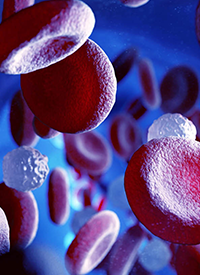News
Article
NX-5948 Receives FDA Fast Track Designation for R/R Waldenström Macroglobulinemia
Key Takeaways
- NX-5948, a BTK degrader, received fast track designation for relapsed/refractory Waldenström macroglobulinemia after prior BTK inhibitor therapy.
- Phase 1 trial data show promising safety and efficacy, with partial responses in most evaluable patients, regardless of mutation status.
The FDA granted fast track designation to NX-5948 for Waldenstrom macroglobulinemia that is relapsed/refractory to at least 2 lines of therapy.
Waldenström Macroglobulinemia |
Image Credit: © Tatiana Shepeleva –
stock.adobe.com

The FDA has granted fast track designation to the brain-penetrant, orally bioavailable, small molecule, highly selective BTK degrader NX-5948 for the treatment of adult patients with relapsed/refractory Waldenström macroglobulinemia (WM) who have received at least 2 lines of therapy, including a BTK inhibitor.1
“Fast track designation for NX-5948 is an important recognition of the unmet patient need in WM, particularly in the growing number of patients whose cancer has progressed following BTK inhibitor therapy,” Arthur T. Sands, MD, PhD, president and chief executive officer of Nurix Therapeutics, stated in a news release. “This designation follows encouraging safety and efficacy data from our ongoing phase 1 [NX-5948-301] clinical trial [NCT05131022], demonstrating early promise of clinical benefit with potential for durable outcomes. We continue to enroll [patients with] WM in the ongoing phase 1b expansion cohort and anticipate sharing additional clinical data in 2025.”
Data from the NX-5948-301 trial were presented at the 12th International Workshop on Waldenstrom’s Macroglobulinemia. The phase 1a dose-escalation portion of this trial is enrolling patients at least 18 years of age with relapsed/refractory WM, non-Hodgkin lymphoma (NHL), chronic lymphocytic leukemia (CLL), or small lymphocytic lymphoma (SLL) who have received at least 2 prior lines of therapy and have an ECOG performance status of 0 or 1.2 In the dose-escalation portion, which will enroll up to 66 patients in the NHL/WM cohort, patients receive NX-5948 at doses escalating from 50 mg daily to 600 mg daily. Patients with WM in the phase 1b dose-expansion cohort must have relapsed/refractory disease and have received a prior BTK inhibitor.
At a data cutoff date of October 10, 2024, baseline characteristics were available for the first 13 patients with WM who were enrolled across the phase 1a and 1b portions of the trial. Patients had a median age of 74.0 years (range, 64-82) and had received a median of 3 prior lines of therapy (range, 2-5). All patients had previously received a BTK inhibitor and chemotherapy or chemoimmunotherapy. Three patients had been previously treated with pirtobrutinib (Jaypirca), and 1 patient had been previously treated with a BCL-2 inhibitor. Baseline MYD88 and CXCR4 mutations were present in 8 and 2 patients, respectively.
Nine patients were evaluable for response; 7 achieved an objective response and 2 had stable disease. All responses were partial and were observed at the first assessment, which took place at week 8 of treatment. Responses were observed regardless of baseline MYD88 or CXCR4 mutation status. In total, 5 patients remained on treatment, 2 of whom have remained on treatment for longer than 1 year.
At the meeting, investigators presented 2 case studies of patients with WM who received NX-5948. One case study patient had baseline mutations in MYD88 and CXCR4 and had received 4 prior lines of therapy, including ibrutinib (Imbruvica) and autologous bone marrow transplantation. This patient achieved a rapid response and remained on the study at the data cutoff, having received treatment with the investigational agent for longer than 1 year. Notably, treatment with NX-5948 resulted in a deepening of response over time in this patient, as measured by a reduction in serum IgM levels.
In the second case study, a patient had a baseline MYD88 mutation and had received 3 prior lines of therapy, including zanubrutinib (Brukinsa). This patient responded to treatment with NX-5948 and had decreasing IgM levels throughout their treatment, which was ongoing as of the data cutoff.
Previously, in January 2024, NX-5948 received fast track designation from the FDA for the treatment of adult patients with relapsed/refractory CLL or SLL who have received 2 or more prior lines of therapy, including a BCL2 inhibitor and a BTK inhibitor.1 Additionally, in November 2024, the European Medicines Agency granted PRIME designation to the agent for the same indication.
References
- Nurix Therapeutics receives U.S. FDA fast track designation for NX-5948 for the treatment of relapsed or refractory Waldenstrom’s macroglobulinemia. News release. Nurix Therapeutics. December 19, 2024. Accessed December 19, 2024. https://ir.nurixtx.com/news-releases/news-release-details/nurix-therapeutics-receives-us-fda-fast-track-designation-nx-0
- O’Connor, P. NX-5948: BTK degrader with activity in lymphoid malignancies. Presented at: 12th International Workshop on Waldenstrom’s Macroglobulinemia. October 19, 2024; Prague, Czech Republic.








